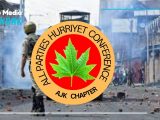
Authorities in IIOJK Withhold Land Records, Raising Transparency Concerns
February 24, 2025The refusal to disclose land records in IIOJK has sparked suspicions of illegal land transfers and corruption.
In Indian Illegally Occupied Jammu and Kashmir (IIOJK), authorities have denied access to land record details under the Right to Information (RTI) Act in Kupwara district. This move has raised concerns about potential efforts to conceal unlawful land transfers to outsiders and other corrupt dealings.
This action defies directives from the Central Information Commission (CIC) and violates IIOJK’s transparency laws, limiting public access to crucial land data. Legal experts and activists argue that such refusals erode public trust and enable illegal practices to flourish unchecked.
Lawyer Rasikh Rasool had submitted an RTI application requesting mutation records for land transactions from 2016 to the present in Bowan and Watsar villages along the Handwara-Bangus Road, under Zachaldara Tehsil. The request sought details such as buyer and seller addresses, gift deeds, and transfer records—information missing from the IIOJK land records portal for two years.
However, Tehsildar Zachaldara rejected the application, claiming the requested data fell under “personal and third-party information.” The response further stated that affected individuals had declined to consent to disclosure. This denial has been widely criticized by legal experts who argue that land records should be public documents to ensure accountability and prevent fraudulent transfers.
Rasool strongly opposed the refusal, arguing that land records are public documents and must be accessible under Section 4(1)(B) of the RTI Act and the Public Records Act, 1993. “This denial is a direct violation of the law and an attack on transparency,” Rasool remarked. “The Revenue Department is legally required to maintain updated and publicly available land records. By withholding this information, authorities are concealing potential misconduct.”
The issue has fueled fears that land in the region is being unlawfully transferred, reinforcing concerns about efforts to alter the demographic structure of the area. Activists and politicians have called for greater scrutiny of land transactions in IIOJK, emphasizing that withholding such records could serve as a cover for illegal dealings benefiting influential entities.
Civil society organizations and legal professionals have urged the IIOJK administration to uphold transparency laws and release the requested land records. Many believe that withholding crucial data prevents accountability and undermines democratic principles. Transparency advocates have emphasized the importance of enforcing RTI laws to prevent large-scale land grabs and exploitation of IIOJK’s resources by non-local entities.
As the controversy intensifies, the call for action grows louder. The administration is now facing mounting pressure to clarify its stance on public land records and ensure that all transactions remain subject to legal scrutiny. If transparency is not upheld, experts warn, it could further deepen distrust between the Kashmiri people and the governing authorities, exacerbating political and social tensions in the region.

